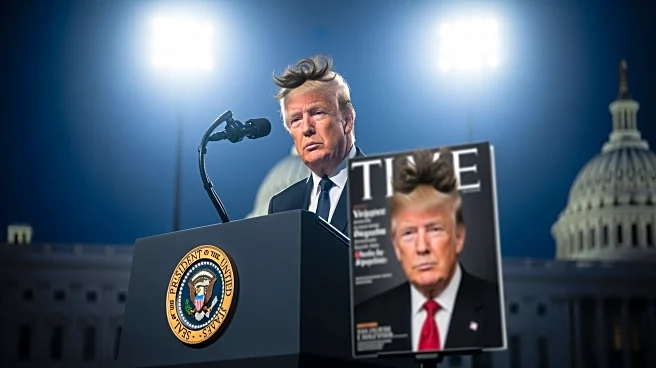What's Happening?
President Trump has expressed dissatisfaction with the cover photo of Time magazine's latest issue, which he claims makes his hair look 'weird.' In a Truth Social post, Trump criticized the image, stating
that it 'disappeared' his hair and featured a small floating crown-like object above his head. Despite the magazine's positive coverage of his role in brokering the Israel-Gaza ceasefire agreement, Trump focused on the perceived alteration of his appearance. The cover story highlights Trump's involvement in the ceasefire deal, which could be a significant achievement of his second term, aiming to end a conflict that has caused extensive casualties and initiate rebuilding efforts in Gaza.
Why It's Important?
The incident underscores the ongoing scrutiny and media attention President Trump receives regarding his personal appearance, particularly his hair, which has been a subject of public commentary for years. This focus on appearance can overshadow substantive political achievements, such as the Israel-Gaza ceasefire agreement. The ceasefire, if successful, could mark a strategic turning point in the Middle East, potentially leading to lasting peace. However, Trump's reaction to the magazine cover highlights how personal image concerns can intersect with political narratives, affecting public perception and media discourse.
What's Next?
Time magazine has not yet responded to Trump's criticism of the cover photo. The broader implications of the ceasefire agreement remain uncertain, as the deal's success depends on continued cooperation between Israel and Hamas. The potential unraveling of the agreement could impact regional stability and Trump's legacy. Meanwhile, media outlets may continue to focus on Trump's personal image, influencing public and political discourse.
Beyond the Headlines
The focus on Trump's appearance raises questions about the role of media in shaping political narratives and the balance between personal image and policy achievements. This incident may prompt discussions on the ethical considerations of media representation and its impact on political figures. Additionally, the ceasefire agreement's potential to alter Middle Eastern dynamics could have long-term geopolitical implications, affecting U.S. foreign policy and international relations.











